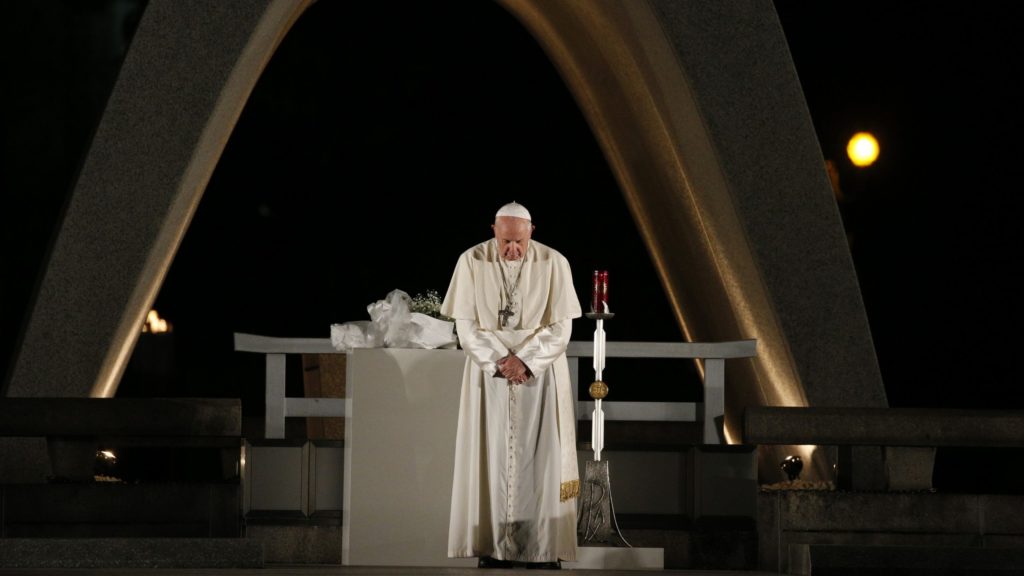A cohort of Japanese and U.S. Catholic bishops have applauded this week’s meeting of nation states that have formally joined the UN Treaty on the Prohibition of Nuclear Weapons as “another historic step on the journey toward hope, toward the light, toward a world free of nuclear weapons.”
The second Meeting of State Parties to the Treaty on the Prohibition of Nuclear Weapons began Nov. 27 at the UN headquarters in New York, where it will run through Dec. 1. The meeting is chaired by Juan Ramón de la Fuente Ramírez, Permanent Representative of Mexico.
The focus of the meeting, according to a news release from the Mexican government, is to assess the status of the treaty’s implementation and discuss the humanitarian impact of nuclear weapons. In addition to representatives from nation-states that have joined the treaty, present at the meeting will be atomic bomb and nuclear test survivors, representatives of international organizations, and other representatives from civil society and the scientific community.
“It is the duty of our dioceses to support this Treaty while working toward universal, verifiable nuclear disarmament,” the bishops said in a Nov. 27 joint statement. “We lend our voices in strong support of the Second Meeting of State Parties to the Treaty on the Prohibition of Nuclear Weapons.”
The group of bishops, whose dioceses all have a connection to nuclear weapons and have all been longtime advocates of nuclear disarmament called the meeting historic despite its limitations, considering participants include only those nation-states who have signed the treaty.
“The international legal force of the Treaty on the Prohibition of Nuclear Weapons is limited to those states that have formally joined the Treaty, but its moral power does not recognize boundaries between nations nor lines on a map—the moral power of this Treaty is global and universal,” the bishops said.
The group of bishops consists of American Archbishops John Wester of Santa Fe and Paul Etienne of Seattle, both who lead an archdiocese with ties to the production and deployment of nuclear weapons. It also consists of Japanese Archbishop Peter Michiaki Nakamura of Nagasaki, Bishop Alexis Mitsuru Shirahama of Hiroshima, and Archbishop Emeritus Joseph Mitsuaki Takami of Nagasaki, who lead the Japanese dioceses the U.S. bombed on August 6 and 9, 1945, respectively.
The group came together during a “pilgrimage of peace” to Japan over the summer led by Wester and Etienne, who were accompanied by organizations and archdiocesan officials dedicated to nuclear disarmament advocacy. The trip coincided with the 78th anniversary of the atomic bombing of Nagasaki.
At the same time, the group announced a new initiative to promote the realization of a world without nuclear weapons. In essence, the initiative is a call for dioceses worldwide to advocate, dialogue, educate and pray for the abolition of nuclear weapons worldwide.
Back in May 2023, the group also called on leaders of the Group of Seven country leaders to take concrete steps towards the abolition of nuclear weapons. In their Nov. 23 statement on this week’s meeting, the bishops acknowledged that “message fell upon deaf ears, and we received no response.”
None of the G7 countries have signed the Treaty on the Prohibition of Nuclear Weapons, which includes the United States, Canada, France, Germany, Italy, Japan, and the United Kingdom.
Of those countries, the U.S. has far and away the most nuclear warheads with 5,244 as of 2022, according to data published in March by the Federation of American Scientists. That is second only to Russia, which has an arsenal of 5,899 nuclear warheads, the data shows.
Third on the list is China with 410 nuclear warheads, followed by G7 countries France and the United Kingdom with 290 and 225 nuclear warheads, respectively. After that there’s Pakistan with 170, and India with 164. No other country has an arsenal of more than 90 nuclear warheads, the data shows.
The Vatican was the first state to ratify the Treaty on the Prohibition of Nuclear Weapons when it opened for signatures in July 2017. It went into effect in January 2021. So far, 69 states have signed and ratified the treaty, and 24 others have signed but not yet ratified.
In 2019, at the Hiroshima Peace Memorial Park, Pope Francis called the possessing of nuclear weapons “immoral.” The pontiff also said at the hypocenter of the atomic bombing in Nagasaki that “we must never grow weary of working to support the principal international legal instruments of nuclear disarmament and non-proliferation, including the Treaty on the Prohibition of Nuclear Weapons.”
In their Nov. 27 statement, the group of bishops called on world leaders to make marked progress towards nuclear disarmament by the 80th anniversary of the Hiroshima and Nagasaki bombings in August, 2025.
“We specifically call upon world leaders to demonstrate measurable progress toward nuclear disarmament by the 80th anniversary of the atomic bombings,” the bishops said. “We know the serious negative consequences for humanity are ever-increasing. August 2025 will be an appropriate time to hold world leaders accountable for progress made on long-delayed, promised nuclear disarmament.”

